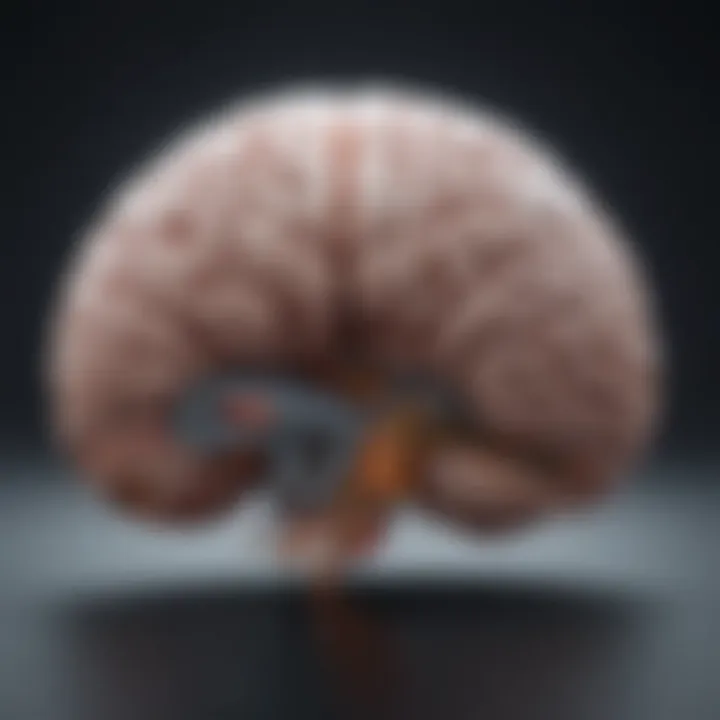Pharmacological Strategies for Memory Enhancement


Intro
Memory is an intricate tapestry woven from countless threads of experience, learning, and cognition. The quest for enhancing memory is as ancient as civilization itself. In modern times, this pursuit has evolved into a scientific endeavor, leading researchers to explore pharmacological interventions aimed at boosting memory power.
Research has revealed various medications that target cognitive function, presenting intriguing possibilities for individuals seeking improvement in their memory skills. These substances, ranging from well-known pharmaceuticals to emerging compounds, operate through complex mechanisms within the brain. A deeper understanding of these processes is crucial, as it provides insight not only into their effectiveness but also into how they might be integrated into everyday life.
This article serves as a comprehensive guide, starting with highlighting the key findings in memory enhancement and discussing the implications of these discoveries. We will delve into the methodologies employed in pertinent research, examining how these experiments are structured and what they reveal about our potential to augment memory. Furthermore, various lifestyle approaches will be considered, emphasizing that pharmacological solutions are not a panacea, but rather part of a multifaceted strategy.
As you move through the sections, we aim to provide a rich and engaging narrative that elevates the discourse around memory enhancement, catering to the inquisitive minds of students, researchers, educators, and professionals.
"A wise man will make more opportunities than he finds." - Francis Bacon
Let’s embark on this exploration and shed light on the intersection of pharmacology and cognitive enhancement.
Prolusion to Memory Improvement
Memory plays a crucial role in our daily lives, impacting learning, decision making, and overall cognitive function. In this increasingly competitive world, the ability to retain and recall information effectively has never been more vital. This article is set to explore various pharmacological interventions aimed at enhancing memory, focusing on how such methods could offer substantial benefits not only for those experiencing memory decline but also for individuals seeking to optimize their cognitive performance.
Understanding Memory in Cognitive Science
At its essence, memory is a complex cognitive function that involves encoding, storing, and retrieving information. Cognitive science delves deep into the workings of the human brain, attempting to unravel the intricate processes underlying these functions. It considers not only what we remember but also how and why we forget. Different types of memory—such as declarative and procedural memory—each have unique characteristics and neural pathways. The brain regions involved, like the hippocampus and the prefrontal cortex, play a pivotal role in these processes.
Current research emphasizes the dynamic nature of memory. It’s not merely a static ledger of facts but a fluid system to adapt and reshape based on new experiences. Studies often highlight the importance of neuroplasticity, enabling our brains to form new connections and, thus, improve memory retention and retrieval.
The Importance of Memory Enhancement
Enhancing memory has implications that reach far beyond academic achievement; it influences our personal lives, careers, and even our emotional well-being. Improved memory can boost self-confidence, foster better relationships, and lead to greater job performance.
The demand for strategies that elevate cognitive abilities is rising, particularly in our fast-paced society where the overload of information can be overwhelming. Cognitive enhancements can provide an edge, whether through pharmacological means or lifestyle changes.
However, one must approach memory enhancement cautiously. The potential benefits must be weighed against ethical concerns and the risk of dependency on pharmacological substances. For that reason, understanding both the effectiveness and limitations of these interventions is paramount. As we navigate through this article, the interplay between memory strategies and their scientific backing will illuminate pathways to not only enhance memory but to foster a more profound appreciation of brain health.
Pharmacological Approaches to Memory Improvement
Memory improvement through pharmacological methods is becoming increasingly significant in both scientific research and practical applications. As people look for ways to enhance cognitive abilities, understanding these approaches opens the door to various treatments that may positively influence memory function. This section investigates different classes of drugs aimed at boosting memory performance, offering insights into the mechanisms, benefits, and considerations tied to their use.
Overview of Cognitive Enhancers
Cognitive enhancers are substances that aim to improve various aspects of cognitive function, particularly memory, attention, and learning. Often categorized into prescription medications and over-the-counter products, cognitive enhancers can include vitamins, herbal supplements, and synthesized compounds.
The importance of these enhancers is particularly pronounced in today's fast-paced world, where mental acuity can determine one's success in academia or the workforce. One might think of cognitive enhancers as tools to "tune up" the mind, akin to a mechanic fueling a car for better performance.
Cholinergic Agents and Memory
Cholinergic agents represent a class of cognitive enhancers that primarily affect acetylcholine levels in the brain, a neurotransmitter frequently linked to memory and learning.
Mechanism of Action
The mechanism of action of cholinergic agents revolves around enhancing the availability of acetylcholine, leading to improved communication between neurons involved in memory pathways. By facilitating synaptic transmission, these agents can potentially improve recall and retention of information. The pivotal characteristic here is the relationship to cholinergic receptors, which, when stimulated, can heighten cognitive functions.
Considering cholinergic agents as a popular choice among pharmacological strategies for memory enhancement is no accident. They are widely studied due to their effectiveness, particularly in conditions like Alzheimer’s disease where cognitive decline is evident. However, it's crucial to remember that while they can improve memory efficiency, they may also bring about side effects like nausea or digestive issues.
Commonly Used Cholinergic Drugs
Some commonly used cholinergic drugs include Donepezil and Rivastigmine. These medications serve as significant players in treating dementia-related disorders. Their primary characteristic is the ability to increase acetylcholine levels in the brain, which is vital for memory consolidation.
The unique feature of cholinergic drugs is their long history of research and clinical use, which is a comforting validation for many users concerned about efficacy. On the flip side, one must weigh the benefits against potential side effects and interactions with other medications, which could pose risks.
Ampakines and Their Role


Ampakines are designed to enhance the action of glutamate, an essential neurotransmitter for learning and memory. By modulating AMPA receptors, these compounds could potentially improve cognitive function without causing the overstimulation commonly seen with other stimulants.
Enhancing Glutamate Activity
The role of enhancing glutamate activity is crucial, as it directly influences synaptic plasticity— a foundational element of learning. This characteristic makes ampakines a fascinating topic of discussion within memory enhancement circles.
Choosing to explore this category of cognitive enhancers could yield positive outcomes for those seeking alternatives to traditional stimulants. However, one must remember the potential for side effects, though they are often perceived as more manageable compared to classic stimulants.
Clinical Trials and Outcomes
Clinical trials surrounding ampakines have shown promising results in improving memory tasks among both healthy individuals and those with cognitive impairments. This aspect is particularly intriguing; the evidence that aims to showcase benefits elevates hopes for future applications in memory issues.
However, the unique feature of clinical trials lies in the variability of outcomes, which could lead individuals to question the robustness of these drugs. A cautious approach is recommended due to the ongoing nature of studies and the need for more longitudinal data.
Nootropics: Benefits and Risks
Nootropics, often dubbed "smart drugs," cover a vast spectrum of memory enhancers, from natural herbal supplements to prescribed medications.
Types of Nootropics
Types of nootropics can range from simply caffeine, known for its alertness-enhancing properties, to complex compounds like Piracetam, which target various neurotransmitters. The broad classification highlights the diversity, making it a staple point in the conversation about memory enhancement.
What's attractive about this category is the accessibility of many nootropic substances, often available without prescriptions. However, it's important to assess their actual efficacy thoroughly, as claims can sometimes outstrip proven benefits.
Safety Concerns and Regulations
While the allure of nootropics is evident, so too are safety concerns and regulatory issues. The lack of stringent oversight means that some products may not deliver the desired results or could even be harmful. Understanding this aspect sheds light on the delicate balance between efficacy and safety, particularly for individuals delving into the world of cognitive enhancement without sufficient knowledge.
Ultimately, the pharmacological approaches to enhancing memory offer exciting possibilities, though they come with a mixed bag of benefits and considerations. As research continues to develop, awareness of each option's specifics will be vital for potential users.
Mechanisms of Memory Formation
Understanding the mechanisms of memory formation is crucial when exploring strategies to enhance cognitive abilities. Memory isn't just about storing facts; it's a dynamic operation that involves numerous processes within the brain. These mechanisms govern how we learn, recall information, and even forget. Recognizing their role allows for more targeted pharmacological interventions and lifestyle adaptations that can boost memory performance.
Neurological Basis of Memory
Role of Synapses
A key component in the neurological basis of memory is the synapse. Synapses are the connection points between neurons through which signals are transmitted. Their role in memory formation cannot be overstated; these connections allow for communication within neural circuits. When synaptic activity increases due to practice or new experiences, synaptic strength enhances, resulting in better retention of information.
The adaptability of synapses, particularly their ability to undergo changes—a process known as synaptic plasticity—is fundamental. This characteristic makes synapses a cornerstone in our examination of memory formation. The more a synapse is used, the stronger it gets. This can be likened to carving a path through thick forest; the more one travels the same route, the clearer and easier it becomes to navigate.
However, it is vital to consider that synaptic changes may not always be a boon. Excessive synaptic strengthening can lead to overstimulation, potentially resulting in cognitive overload or other negative effects. Thus, while beneficial, the synaptic role in memory involves a fine balance.
Neuroplasticity and Learning
Another crucial aspect of memory formation is neuroplasticity, which refers to the brain's ability to reorganize itself by forming new neural connections throughout life. This remarkable feature shows that learning isn’t just a juvenile characteristic; even adults can teach their brains to learn new tricks. Neuroplasticity is a significant player in how experiences shape our cognitive abilities and memory.
Innovatively, neuroplasticity allows the brain to compensate for injuries and adapt to new learning situations. For instance, a musician training for years will develop enhanced auditory memory pathways compared to someone who only occasionally engages with music. This specialty helps us understand how targeted training and experiences can bolster memory retention and recall capabilities.
The dual ability of neuroplasticity to foster new learning while sometimes burdening existing networks poses a double-edged sword. While it enhances our mastery over skills and knowledge, there’s the potential for interference where similar memories could clash or become conflated, highlighting the necessary care in memory enhancement pursuits.
Effects of Pharmacology on Neuroscience
Pharmacological interventions can significantly influence the mechanisms of memory formation by acting directly on the neurological processes outlined above. Certain medications are designed to enhance synaptic activity or support neuroplasticity, leading to improved cognitive functions. However, understanding which specific drugs interact beneficially with these mechanisms is essential for informed application.
For instance, drugs that increase the availability of neurotrophic factors can support the growth of connections in synapses. On the flip side, it's also critical to recognize that some drugs may inhibit synaptic plasticity, potentially leading to memory deficits. This complexity is why a comprehensive understanding of both pharmacologic effects and the underlying neural mechanisms is necessary for gauging how best to enhance memory capabilities.
Complementary Approaches to Memory Enhancement


In the realm of memory enhancement, pharmacological remedies often steal the spotlight. However, it's crucial not to overlook complementary approaches. These include dietary adjustments and lifestyle factors, which play an essential role in shaping our cognitive capabilities. By taking a holistic view, we can uncover a wider array of options for those seeking to boost their memory.
Dietary Influences on Memory
Nutrition has a profound impact on cognitive health. The foods we consume and the nutrients they bring can either fortify or hinder our brain's performance. Hence, making informed choices in our diets can support memory enhancement significantly.
Nutrients Vital for Cognitive Health
Certain nutrients hold critical importance for brain functioning. Omega-3 fatty acids have garnered attention for their role in promoting neural health. These fats, found abundantly in fish like salmon or in flaxseeds, are known to support synaptic plasticity—a key player in the learning process. Their anti-inflammatory properties also contribute to a healthier brain environment, which is crucial for memory retention.
Another remarkable nutrient is antioxidants, particularly those derived from berries, nuts, and green leafy vegetables. These compounds combat oxidative stress, which can damagingly affect cognitive functions. The unique feature of these nutrients lies in their ability to enhance neurogenesis, fostering the growth of new neurons that can improve memory function.
Advantages: Incorporating these nutrients into one’s diet is often straightforward and has the dual benefit of improving overall health.
Disadvantages: It's important to maintain a balance, as excessive intake of certain supplements could lead to complications.
Foods That Enhance Memory
Specific foods have been dubbed 'brain foods' for their potential to enhance memory. Blueberries, for instance, are rich in compounds that enhance communication between neuronal cells, thereby facilitating learning and memory. Another noteworthy mention is turmeric, which has been associated with improved cognitive health due to its active compound, curcumin.
The key characteristic of these foods is their accessibility and incorporation into everyday meals. They not only provide memory benefits but contribute to overall well-being.
Advantages: They are often enjoyable flavors and textures, making it easier to maintain a diet that supports memory health.
Disadvantages: Relying solely on these foods, without proper dietary variety, may lead to nutrient deficiencies.
Lifestyle Factors and Cognitive Function
Beyond diet, lifestyle choices also have significant implications for cognitive function. Engaging in regular physical activity and ensuring proper sleep are foundational elements that nurture cognitive health, playing a crucial role in memory enhancement.
Physical Exercise and Brain Health
Physical exercise is not just beneficial for our bodies; it’s a powerhouse for our brains, too. Engaging in aerobic activities like running or cycling has been linked to increased blood flow to the brain, which nourishes it with oxygen and nutrients necessary for memory functions. It also promotes the release of growth factors like BDNF (Brain-Derived Neurotrophic Factor) that aid in neuron health.
The unique feature of physical exercise is its capacity to foster a neuroprotective environment, reducing risks of cognitive decline associated with aging.
Advantages: It's a multifaceted approach that delivers both physical and cognitive rewards.
Disadvantages: Some may find it challenging to integrate regular exercise into their busy schedules, potentially leading to inconsistencies in routine.
Sleep's Impact on Memory
Sleep is often the unsung hero of cognitive health, yet its impact is undeniable. During sleep, the brain consolidates memories, transferring them from short-term to long-term storage. Lack of adequate sleep hampers this process, leading to forgetfulness and diminished cognitive performance.
The key characteristic of quality sleep is not solely about duration but also about sleep cycles. Deep REM sleep is particularly important for memory consolidation.
Advantages: Focusing on sleep hygiene—like maintaining a regular sleep schedule and a conducive sleep environment—can enhance memory consolidation strategies effectively.
Disadvantages: Many find it difficult to prioritize sleep in a demanding world, resulting in chronic sleep deprivation, which can have compounding negative effects on memory and cognition.
Ethical Considerations in Memory Enhancement
The discussion surrounding memory enhancement through pharmacological means is not just about efficacy and mechanisms of action, but it also delves into the ethical implications of this practice. As neuroscience progresses and cognitive enhancers become more accessible, important questions arise regarding the moral dimensions of using drugs to boost memory. This section aims to highlight significance of engaging in a balanced discourse about what cognitive enhancement entails and its broader consequences.
The Debate on Cognitive Enhancement
In the cryptocurrency world, people often talk about FOMO—fear of missing out. This sentiment can likewise apply to cognitive enhancements. As more individuals recognize the potential of pharmacological interventions to enhance memory capabilities, the debate intensifies. Some argue that these enhancements could create an uneven playing field, especially in employment and education.
Consider the example of college students who may resort to medications traditionally prescribed for ADHD. These students might believe they gain a competitive edge by taking stimulants like Adderall or Ritalin. However, this raises critical questions: What are the implications on fairness? Should students feel pressured to engage in what might be viewed as chemical doping?


There are advocates arguing that enhancing cognition could lead to increased productivity, creativity, and overall intellectual development. They posit that cognitive enhancers can help individuals achieve their potential. On the contrary, fears about dependency, misuse, and unequal access pile on ethical concerns. Moreover, individuals with access to these medications could inadvertently ostracize those who cannot afford or obtain them.
Additionally, societal norms may shift in response to widespread cognitive enhancement. We could find ourselves in a tricky situation where mental augmentation becomes normalized, leading individuals to feel inadequate without pharmacological assistance. Such dynamics can foster a troubling narrative about self-worth and capability.
Access and Equity in Treatment
Another cornerstone of the ethical discussion is access to memory enhancement treatments. Not everyone has equal footing when it comes to obtaining pharmacological aids. Economic factors and healthcare disparities heavily influence access.
Consider these aspects:
- Cost of Medications: Premium cognitive enhancers often come with a hefty price tag, sidelining those who cannot afford them.
- Healthcare System Disparities: Not all healthcare systems prioritize mental health equally, leading to gaps in treatment access.
- Stigmatization: The stigma surrounding using medication for cognitive enhancement could deter individuals from seeking help.
The landscape thus becomes quite complicated. As memory-enhancing drugs gain traction and development continues, we must think about how to mitigate these inequities. Potential solutions could involve educational campaigns, subsidies for medications, or promoting open discussions about cognitive health in various communities.
"A society that values enhancement must also prioritize accessibility for all its members, to ensure cognitive development is not a privilege but a shared opportunity."
The ethical considerations in memory enhancement encapsulate a delicate balance between leveraging scientific advancements for improved cognitive function and ensuring these benefits do not lead to divisions within society. As ongoing research continues to shed light on both pharmacological and complementary interventions, we must remain vigilant and engaged in discussions about access, equity, and the moral responsibilities that accompany these potent tools.
As we journey through the future of memory enhancement, it is vital to keep in mind these ethical dimensions. Only by thoughtfully navigating these issues can we hope to create a landscape that nurtures cognitive flourishing for all.
Future Directions in Memory Research
Exploring new avenues in memory research is crucial within the broader context of cognitive enhancement, particularly looking at pharmacological interventions. This topic provides insight into cutting-edge therapies and how they can potentially revolutionize our understanding of memory. With an increasing emphasis on maintaining cognitive health alongside aging populations, it’s pertinent that this field keeps evolving. By focusing on innovations, researchers can identify more effective methods to enhance memory and learning capacities, ultimately addressing the challenges faced by individuals with memory impairments.
Emerging Therapies and Technologies
Advancements in therapeutic technology are becoming the norm rather than the exception. The merger of neuroscience with artificial intelligence has opened the door to novel treatments. For example, we’re now seeing developments in brain stimulation techniques like transcranial magnetic stimulation (TMS). TMS has shown promise in enhancing cognitive function, suggesting that non-invasive methods may complement traditional pharmacological approaches.
- Neural Interfaces: The evolution of brain-computer interfaces can introduce new ways to train memory pathways. Researchers are experimenting with devices that can stimulate neural activity in real time, potentially enhancing memory recall.
- Personalized Medicine: Another exciting prospect is personalized pharmaceuticals. Tailoring drug types and dosages based on individual genetic profiles could significantly increase efficacy while minimizing adverse effects. This is particularly important considering the unique neurochemistry of every individual.
- Novel Compounds: Increased research into compounds like flavonoids found in everyday fruits and vegetables shows potential for memory enhancement. These compounds can exert beneficial effects on neural pathways and could lead to the development of new dietary supplements aimed at bolstering cognitive function.
With these emerging technologies, the horizon for memory enhancement appears promising yet requires rigorous study and validation before widespread application.
The Role of Genomics in Cognitive Enhancement
Genomics plays an instrumental role in understanding how memory works on a molecular level. By examining the human genome, researchers can uncover the genetic markers associated with memory performance. Such knowledge lays the groundwork for future pharmacological interventions that can target specific genes or receptors associated with cognitive functions.
- Gene Editing: Techniques like CRISPR offer groundbreaking opportunities to edit genes responsible for memory functions. This kind of innovation raises both hope and ethical concerns regarding memory enhancement.
- Genetic Predisposition: Understanding individual genetic backgrounds can help identify those at risk for cognitive decline. This knowledge can facilitate targeted prevention strategies.
- Pharmacogenomics: The intersection of pharmacology and genomics offers the potential for personalized drug responses. Knowing how someone might metabolize a drug can drastically change treatment strategies for memory issues.
"The intersection of genomics and pharmacology may unlock doors we never knew existed in memory research."
The exploration of these future directions stands to not only enhance our grasp on memory and cognition but also open new pathways for interventions that are tailored specifically to individual needs. As the scientific community pushes forward, keeping an eye on ethical considerations remains paramount. This balance between innovation and responsibility can lead the way toward meaningful breakthroughs in the realm of cognitive enhancement.
The End: Balancing Pharmaceuticals and Lifestyle
In the quest to enhance memory, it’s crucial to acknowledge that pharmacological interventions are just one part of the puzzle. This article has outlined various medications that claim to bolster cognitive function, delving into how they work and their potential impacts. However, it’s imperative to consider that memory improvement isn't solely reliant on pills.
Pharmaceuticals, while beneficial, should be balanced with lifestyle choices. A well-rounded approach not only maximizes the efficacy of cognitive enhancers but also promotes long-term brain health. Factors such as nutrition, regular exercise, and quality sleep often work wonders, complementing the effects of medications. For example, antioxidant-rich foods like blueberries could potentially support neurological health alongside nootropic supplements.
"The brain thrives in a holistic environment, where medicine and lifestyle create a symphony of cognitive clarity."
Benefits of this balanced approach include:
- Enhanced overall brain function
- Reduced side effects from medications
- Improved long-term health outcomes
While pursuing pharmacological enhancements, it’s vital to maintain a healthy skepticism. Some memory-enhancing drugs might offer fleeting benefits or come with a fair amount of risks. Therefore, ensuring an integrated strategy—using both pharmacological aids and lifestyle modifications—is key.
Summary of Findings
The exploration of pharmacological interventions has illuminated various aspects of memory enhancement. Cholinergic agents, for instance, reveal potential through boosting acetylcholine, crucial for memory and learning. Meanwhile, ampakines have shown promise by enhancing synaptic transmission, offering a new frontier for cognitive enhancement.
It’s also essential to note that the safety and efficacy of nootropics vary significantly, necessitating a careful examination of their use in different populations. The ethical considerations related to access and the implications of widespread cognitive enhancement also deserve attention. Overall, while pharmaceuticals have significant potential, they cannot replace a well-balanced lifestyle that directly supports cognitive health.
Final Thoughts on Memory Enhancement Strategies
Memory enhancement should be viewed as a journey, requiring a multifaceted approach. While recent advancements in pharmacology offer exciting possibilities, it's the synergy between medications and lifestyle practices that truly holds promise. Incorporating healthy dietary choices, engaging in physical activity, and ensuring sufficient sleep will not only boost the effectiveness of pharmacological aids but also foster lasting cognitive resilience.
The road ahead in memory enhancement is rich with possibilities. Students, educators, and professionals alike must navigate the evolving landscape of both medications and holistic practices, tailoring strategies to their unique situations. This balanced focus will ultimately pave the way toward maximizing cognitive potential efficiently and sustainably.



